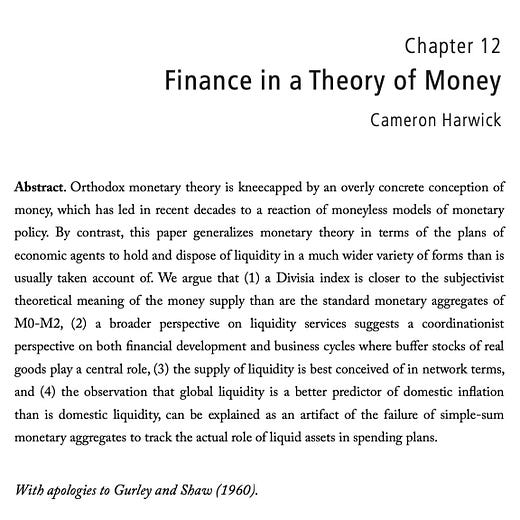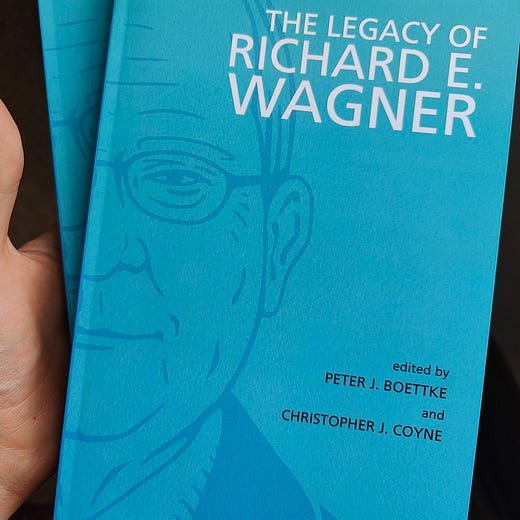Best of #econtwitter - Week of February 26, 2023: paper summaries
Feb 27, 2023
Welcome readers old and new to this week’s edition of Best of Econtwitter. Please submit suggestions — very much including your own work! — over email or on Twitter @just_economics.
Idiosyncratic favorites

Evan Starr@evanpstarr
🚨New WP🚨 w/Takuya Hiraiwa & @MichaelLipsitz
"Do Firms Value Court Enforceability of Noncompete Agreements? A Revealed Preference Approach"
Not for workers at the 79th earnings pctile! Firms didn't raise pay to ensure NCAs could be enforced in court. papers.ssrn.com/sol3/papers.cf… /1

11:29 AM · Feb 20, 2023
19 Reposts · 55 Likes

Evan Starr@evanpstarr
Using admin data covering all workers in WA, and three complementary difference-in-differences approaches, we find that earnings did not bunch at the earnings threshold. /5

11:29 AM · Feb 20, 2023
1 Repost · 3 Likes

Evan Starr@evanpstarr
Finally, we answer a related question: do shareholders suffer because firms are unable to enforce NCAs for a large portion of their workforce?
We find that the answer is no: Tobin's q is unaffected by the law. /8

11:29 AM · Feb 20, 2023
2 Reposts · 6 Likes
Paper summaries

Michal Soltes@michalsoltes
In our recent working paper w/ @JakubGrossmann2 and @FPertold, we show that an increase in parental allowance (PA) led to a substantial decrease in maternal labor supply.
👉papers.ssrn.com/sol3/papers.cf…

8:27 AM · Feb 21, 2023
4 Reposts · 18 Likes

Anselm Hager@anselmhager
Across Berlin, Holocaust victims are remembered with stumbling blocks. The memorials always leave a deep impression on me. Do such memorials affect attitudes? In a new paper, we find the blocks have a negative “effect” on the vote-share of the xenophobic AfD party.

1:13 PM · Feb 23, 2023
140 Reposts · 864 Likes

Anselm Hager@anselmhager
@miguelmaria In our paper, we collected the time and location of all nearly 10,000 Berlin stumbling blocks. We then exploit this temporal and geographic variation and correlate it with the AfD’s vote share across seven elections in local precincts (N = 2200).

1:18 PM · Feb 23, 2023
4 Reposts · 39 Likes

Lindsey Bullinger@lindsbullinger
We find that in the 4 days following the payments, child abuse/neglect-related visits drop. But, they return to similar levels quickly thereafter. Effects are strongest for male children and non-Hispanic White children. 4/

7:17 PM · Feb 22, 2023
8 Reposts · 35 Likes

Dan Devine@DanJDevine
Across five countries we show that people's trust responses are surprisingly stable over the life course - they don't change much from the first to subsequent waves.


11:41 AM · Feb 22, 2023
2 Reposts · 11 Likes

Abhijit Tagade@atagade1
Thrilled to share about our WP!
We study tradeoffs inventors face b/w expanding their network of collaborators to get new ideas vs fearing they might get stolen.
We show that despite having a larger pool of potential coauthors, inventors partner with fewer new collaborators. 1/

CEPR @cepr_org
New CEPR Discussion Paper - DP17911
Innovation Networks and Business-Stealing
Philippe Aghion @cdf1530 @LSEEcon @INSEAD, @JacksonmMatt @StanfordHumSci, @AntoineMyrwtz @PSEinfo @cdf1530, @atagade1 @LSEEcon
https://t.co/SSd2GmkjkU
#CEPR_MG, #CEPR_OE https://t.co/iyqq7YDGVv
2:47 PM · Feb 20, 2023
14 Reposts · 85 Likes

Journal of Public Economics@JPubEcon
What is the return to more years in college?
In the largest public univ in Singapore, a 4th year (determined by grade-based RD) yields 12% extra $$ (lasting at least 4 years)
Mechanism: probably human capital accumulation.

10:21 PM · Feb 21, 2023
5 Reposts · 19 Likes

Aurélien Goutsmedt@AGoutsmedt
1/ @alxndr_trc & I just released a Digital History of Macroeconomics interactive platform digitalhistoryofscience.org/dhm/ a project funded by HES @Societies_HET
@alxndr_trc has shown the main features; I’ll show you a (tiny) sample of what we can learn from it about history of macro

Alexandre Truc @alxndr_trc
1/13 @agoutsmedt and I are pleased to release DHM: a Digital History of Macroeconomics interactive platform https://t.co/3eid9Vd91m. The platform allows the exploration of macroeconomics history from 1969 to 2015. Here is a rundown of its features: https://t.co/doA3Mw2iaA
6:47 PM · Feb 22, 2023
20 Reposts · 44 Likes

Aaron Roth@Aaroth
Our paper on reconstructing the private data of US citizens from publicly released Census statistics is now out in PNAS. You can read about it here: blog.seas.upenn.edu/u-s-census-dat… and find the paper here: pnas.org/doi/10.1073/pn…. Read on for the TLDR. 🧵

2:45 PM · Feb 21, 2023
47 Reposts · 169 Likes
^not having read the paper, would be interested in a clearer quantification of “how bad is this”

NBER@nberpubs
Three percent of US voters are registered to vote in two states. Their voting reflects incentives and costs, being more prevalent in swing states and auto-mailed ballot states, from Gordon B. Dahl, Joseph Engelberg, @RunjingLu, and @w_mullins_ nber.org/papers/w30972

5:00 PM · Feb 24, 2023
3 Reposts · 11 Likes
^ …?

Ian Mitchell@EconMitch
How important are emerging economies to funding international development organisations?
No-one has ever looked at this systematically over time - so, @SamHugh3s and I look back a decade, and forward to 2050.
5 key findings:
6:58 PM · Feb 22, 2023
9 Reposts · 34 Likes

Garett Jones@GarettJones
The Thrift Transplant:
Americans whose parents came from high-savings countries put away more for retirement themselves.
New finding from Jason Richwine.
Draws on new questions in the CPS-- and reinforces UK and German findings of a Thrift Transplant.

6:46 PM · Feb 23, 2023
13 Reposts · 35 Likes
^(this is in dollar terms, not percentage terms — complicates interpretation)

Cameron Harwick 👾🏛@C_Harwick
My chapter "Finance in a Theory of Money" has just been published in the new @mercatus festschrift for Richard Wagner, where I argue for an "ecological" monetarism. mercatus.org/hayekprogram/r…
Summary thread below. 🧵


3:52 PM · Feb 25, 2023
7 Reposts · 27 Likes

Yan Chen@yanchen
In a randomized field experiment at a large ride-sharing platform, we randomly assign drivers into teams and have them compete for cash prize for a week. We find that treated drivers work longer hours and earn 12% higher revenue. pubsonline.informs.org/doi/full/10.12…
6:05 PM · Feb 18, 2023
15 Reposts · 92 Likes

Adam Soliman@adamksoliman
🚨NOW IN PRINT🚨
Harsher penalties are intended to deter crime & focus of policy and research often on offenders. I instead focus on police & find
1⃣ Police respond to changes in punishment severity
2⃣ Severity & enforcement effort are complements
journals.uchicago.edu/doi/10.1086/72…
(1/5)
2:41 PM · Feb 22, 2023
24 Reposts · 140 Likes

Margaret Samahita@msamahita
I am happy to share that my paper "Too much commitment? An online experiment with tempting YouTube content" (with Claes Ek @econGU) is now published in JEBO:
doi.org
Redirecting
10:08 AM · Feb 23, 2023
11 Reposts · 64 Likes

Marko Terviö@MarkoTervio
A new article by Keuschnigg, van de Rijt and Bol
doi.org/10.1093/esr/jc…
finds that the relation of average cognitive ability and wages plateaus at the top 10 percentiles.
They used Swedish data; I use similar Finnish data and find that the relation gets steeper near the top.

9:59 PM · Feb 19, 2023
42 Reposts · 206 Likes

Jesper-Bojeryd@BojerydJesper
@Scientific_Bird @tylercowen The Swedish conscript test has like 9 points total and only integers. If the Finnish has a finer scale, that could explain it.
The test was probably not design for studies of long-term outcomes of conscripts, but only an effective way to sort cohorts of men for assignments
2:44 PM · Feb 20, 2023
9 Likes
More paper summaries

Paul Hünermund@PHuenermund
Important paper by Philippe Aghion, Ufuk Akcigit, Ari Hyytinen, and Otto Toivanen. Parental education explains most of the correlation between parental income and invention. But the extent of its causal effect can be shaped by education policy. nber.org/papers/w30964


7:52 AM · Feb 20, 2023
23 Reposts · 74 Likes

Leonardo D'Amico@leonardo_damico
Can subsidies help poorer places grow?
Place-based policies are gaining substantial traction among U.S. policymakers. The leitmotif is that directing job subsidies and other aid to poorer regions might help them grow and recover from adverse shocks
Is this the case?🧵1/
6:48 PM · Feb 22, 2023
22 Reposts · 92 Likes

Benjamin Blumenthal@bnjmnblmnthl
Happy to share a new and improved version of "Policymaking under Influence" 😊😊
Comments are more than welcome and appreciated!
Link: doi.org/10.31235/osf.i…
Abstract:

2:50 PM · Feb 23, 2023
9 Reposts · 59 Likes

Gabriele Gratton@grattonecon
It’s finally here!
@grattonecon @bartonelee2 in
DRAIN. THE. SWAMP.
A Theory of Anti-Elite Populism
PDF👇 + 🧵
gratton.org/papers/DrainTh…

7:51 PM · Feb 20, 2023
6 Reposts · 41 Likes

Mirco Tonin@mircotonin
"#Inattention Matters: An Analysis of Consumers’ Inaction in Choosing a #Water Tariff" with Florian Heiss & @carmine_ornaghi available open access at @JEEA_News
doi.org
Inattention Matters: An Analysis of Consumers’ Inaction in Choosing a Water Tariff

9:23 AM · Feb 20, 2023
3 Reposts · 11 Likes

Iñaki Aldasoro@i_aldasoro
Our article just published at JIE!
*The macrofinancial effects of international bank lending on emerging markets*, w/ the amazing @paulabeltrans @fgrinberg & T Mancini-Griffoli
Get your free copy at: authors.elsevier.com/a/1geAN5330fA21
Read thread for some goodies for researchers

2:02 PM · Feb 23, 2023
36 Reposts · 157 Likes

Simon Lloyd@splloyd_econ
New @CamEcon / @CFMUK / @janewayinst working paper with Emile Marin (@UCDavisEcon ): "Capital Controls and Free-Trade Agreements" 1/7
lse.ac.uk/CFM/assets/pdf…

11:26 AM · Feb 25, 2023
7 Reposts · 34 Likes
